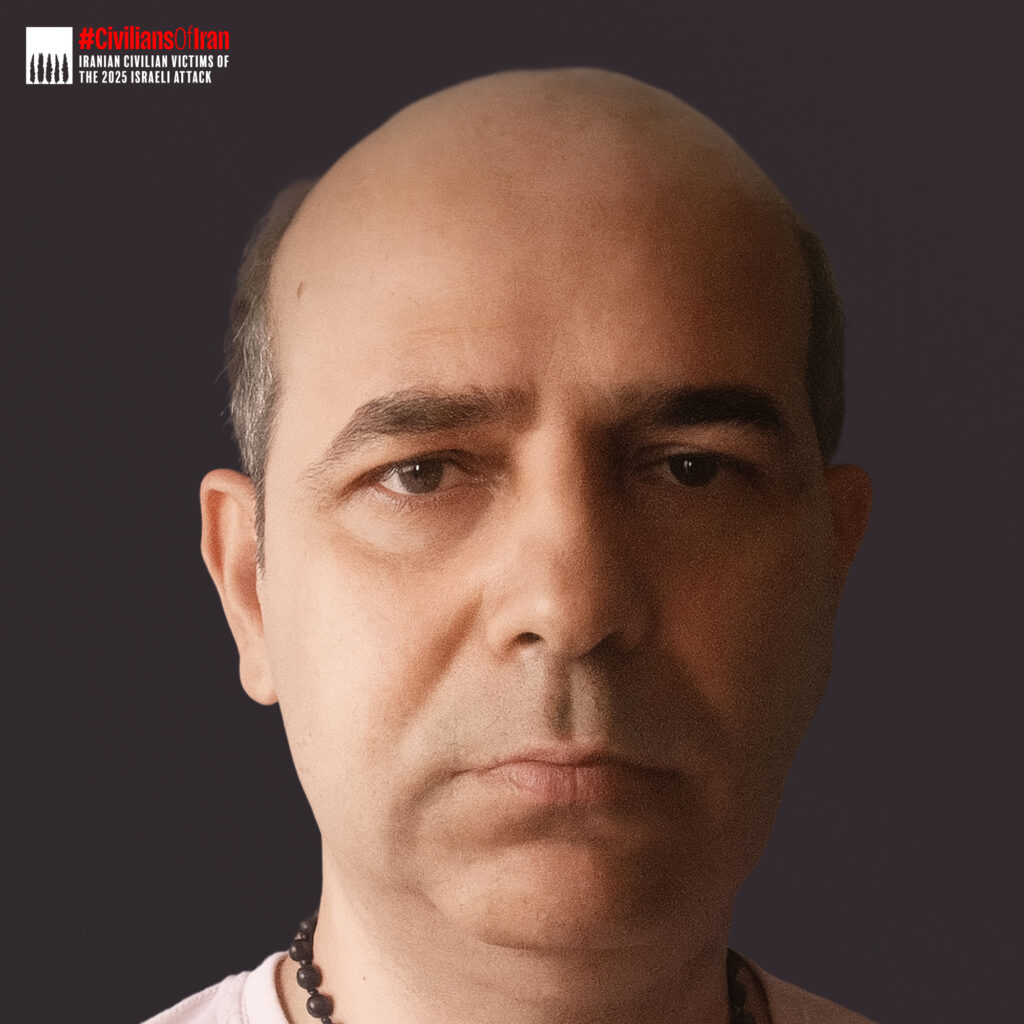Hojjat Rouyintan: The hospital service staff who danced to reduce the anxiety of war victims
Hojat Rouyintan was a 49-year-old janitor at Tehran’s Valiasr Hospital. A man who danced to ease the anxiety of his colleagues in the hospital, as they were afraid that Israel might bomb their hospital too.
On the morning of June 19, the radiology department was tense and silent as fear spread among staff over rumors of possible Israeli attacks. A doctor played upbeat music to lift the mood. Hojat stepped forward and danced, dispelling the anxiety and bringing laughter to his colleagues. Just days later, on June 23, that fear became a reality. Hojat was killed in an Israeli missile strike on buildings surrounding Valiasr Hospital on Valiasr Street. He wasn’t working at the hospital that day. He was working an extra shift as a night guard in a housing complex next to the hospital, a side job he had taken to earn extra money for his family. The explosion caused a wall to collapse and injured others nearby. Hojat was buried under the rubble. It took until the next day for search teams, aided by rescue dogs, to find his body 500 meters from the original site of the attack.
He and his wife, Sanaz Hadidi, had worked together as cleaners for 18 years, both on fixed-term contracts. Their income was not enough to support their family, especially considering the rent and the high cost of their daughter’s university preparatory courses. They had two children: Sogand, 17, and Amirali, 15. Hojat was known not only for his hard work but also for his spirit, a man who could change the atmosphere of an entire hospital ward with a smile or a dance. On the last day of the Israeli attacks on Tehran, Sanaz, Hojat’s wife, had finished her shift and returned home.
“I would talk to him on the phone until 11:10 a.m.,” she recalls. “That day, because the Sepah Bank was down, they told us to open an account at Bank Melli or Bank Mellat to receive our salaries. I was in touch with him all morning, going from one bank to another. At 11 a.m., I told him I had opened an account and sent him photos of the documents on an internal messenger, but they were never seen.”
Sanaz says: “Then a friend of mine called and asked for my number but didn’t say why. I kept calling my husband, but there was no answer. I tried until 12:45 p.m. Finally, I heard that the area around the hospital had been hit. I rushed there and found out. He was working as a security guard in a residential complex right next to the hospital. The blast wave caused a wall to collapse, injuring several of his colleagues. At first, they couldn’t find him. It took until the next day, when rescue dogs helped pull his body out of the rubble.”
His colleagues, like Dr. Amirhossein Jafari Sepehr, remember him not just as a colleague but as a presence. “Damn the war. And all those who feed it,” the doctor wrote. On his Instagram, he wrote: “On Thursday morning, June 19, I went to the radiology department of the hospital. The atmosphere was filled with anxiety. The staff – both men and women – were terrified. Some of the women were on the verge of fainting. A rumor was spreading: that an Israeli hospital had been hit by Iranian missiles the day before and ours could be next. They said that the FARAJA command center, right next to us, had been hit the day before. Tensions continued to rise. To break the tension, I gathered everyone in a room and said, “Let’s play some happy music. We did. I asked the men to come dance, but no one moved – they were too shy. So I broke the ice and started dancing myself. Then Hojat Rouyintan, our supervisor, came forward. His movements completely changed the mood. After that, we could all breathe a sigh of relief”.
Now, after Israel bombed a building near the hospital, Hojat is no longer among the hospital colleagues to ease their anxiety with his dancing, but his memory still lives on in the minds and memories of among the hospital colleagues.


